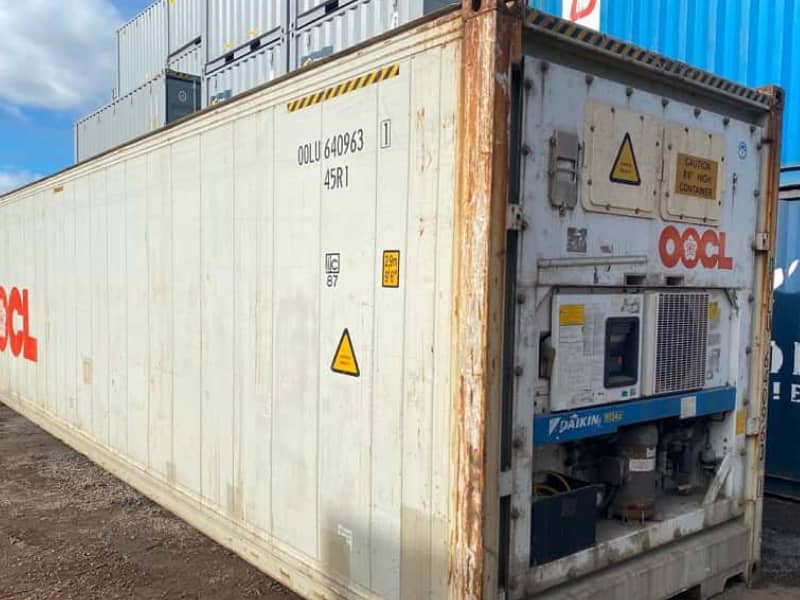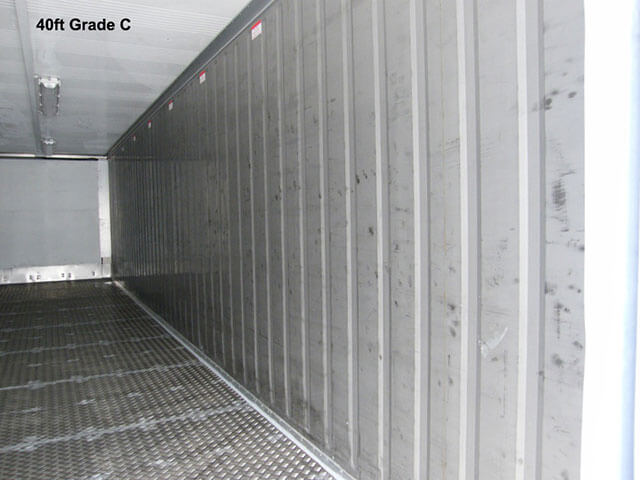Secure affordable used 40ft refrigerated shipping containers for transport
All Concerning Cold Storage Space Containers: Essential Insights for Your Storage Space Needs
Freezer containers play a vital duty in the preservation of perishable goods. They can be found in numerous forms, consisting of chilled and protected units, each made for certain storage space demands. Recognizing the advantages and crucial functions of these containers is essential for businesses intending to maximize their operations. As the need for reliable storage space options expands, exploring the various choices offered can lead to notified choices that affect both earnings and sustainability. What elements should one think about when picking the appropriate container?
Types of Cold Store Containers
Freezer containers can be found in numerous types, each developed to meet specific temperature control requirements. Among one of the most typical kinds are chilled containers, which preserve temperatures in between 0 ° C to 10 ° C, making them suitable for perishable items like fruits, vegetables, and milk items. Another kind is the deep fridge freezer container, which runs at temperatures below -18 ° C, ideal for long-term storage of icy things such as meats and seafood.
Protected containers provide temperature level security without energetic air conditioning, making them valuable for short-term transport of temperature-sensitive products. Furthermore, there are mobile freezer devices, which use versatility in areas and are frequently utilized in events or seasonal procedures. Ultimately, blast chillers rapidly decrease the temperature of hot foods, ensuring safety and high quality. Each kind serves a distinct objective in different industries, from food service to pharmaceuticals, highlighting the importance of picking the ideal container for specific storage needs.

Benefits of Making Use Of Cold Store Solutions

Moreover, cold storage space solutions expand the service life of items, minimizing waste and raising success for businesses. By successfully taking care of stock with proper temperature level control, firms can maximize their supply chains and enhance functional effectiveness.
Furthermore, cold storage facilities enable flexible storage space options, fitting various quantity demands and seasonal changes sought after (used 40ft refrigerated shipping containers). This adaptability assists organizations respond swiftly to market changes
Using chilly storage space solutions can ensure compliance with health and wellness and security guidelines, protecting both services and customers. In general, the strategic use of cold store improves product management while promoting sustainability and financial viability.
Secret Attributes to Try To Find in Cold Storage Containers
When picking freezer containers, numerous vital features advantage mindful consideration to secure peak performance and integrity. Temperature control capacities are important; containers should maintain consistent temperatures appropriate for details goods. Insulation quality also plays a substantial function, as exceptional insulation reduces power consumption and improves temperature level stability.
Next off, simplicity of accessibility and loading is vital; containers need to offer straightforward styles for reliable handling and organization. Durability is an additional important facet; weather-resistant materials guarantee durability and protect components versus environmental variables.
In addition, wheelchair attributes, such as built-in wheels or lifting points, assist in transport, while personalized layouts enable customized storage solutions.
Lastly, checking systems, including temperature alarms and remote tracking, give real-time updates, making sure that conditions remain perfect. By focusing on these features, individuals can select cold store containers that fulfill their operational demands successfully.
Picking the Right Cold Storage Container for Your Demands
Selecting the right chilly storage space container needs a thoughtful assessment of functional demands and specific demands. Elements such as the kind of items being stored, temperature level of sensitivity, and volume must be focused on. Perishable food items might necessitate containers with rigorous temperature controls, while pharmaceuticals might require specific conditions to preserve efficacy.
In addition, possible customers ought to consider the container's dimension and wheelchair. A larger device might be necessary for mass storage, while smaller sized, mobile choices could be excellent for short-term or on-site requirements. Insulation quality and energy performance are also critical, as these will affect operational prices and temperature level stability.
Last but not least, compliance with industry laws and standards is essential, particularly in industries like food and medical care. By carefully reviewing these facets, individuals can select a freezer container that successfully satisfies their special requirements and guarantees optimum storage problems.
Finest Practices for Preserving Freezer Conditions
Maintaining optimal cold store problems is necessary for maintaining the top quality and safety of temperature-sensitive products. Frequently keeping track of temperature level and moisture levels is essential; using trusted electronic thermostats and hygrometers can give exact readings. Correct insulation of cold storage containers assists minimize temperature level variations and power loss.
Implementing a first-in, first-out (FIFO) system ensures that older stock is made use of prior to more recent supply, minimizing waste (used 40ft refrigerated shipping containers). Additionally, maintaining an organized layout within the storage space permits better airflow and decreases the risk of cross-contamination
Regular maintenance look at tools, such as seals and compressors, are necessary to stop breakdowns. Team training on finest methods for filling and unloading products helps maintain temperature level honesty. Finally, keeping doors shut as long as possible limits warm exchange, guaranteeing that the cold store environment stays steady and effective in protecting useful products.
Expense Factors To Consider for Cold Store Solutions
When assessing freezer options, it is necessary to consider the initial financial investment costs along with ongoing operational expenditures. An extensive malfunction of these prices can reveal significant long-term financial savings capacity for companies. Comprehending these monetary elements helps stakeholders make notified decisions concerning their freezer needs.

Initial Investment Expenses
The economic landscape of cold store containers presents different first financial investment costs that services should think about. These expenses generally consist of the purchase or rental rate of the containers, which can differ based on type, size, and insulation top quality. Furthermore, expenses connected to retrofitting existing frameworks to accommodate cold store needs to be factored in, specifically if specialized equipment is called for. Setup expenses, including electrical work and refrigeration systems, also add to the total initial financial investment. Organizations should not ignore transport prices for supplying containers to their preferred place. Ultimately, possible modification alternatives, such as shelving or temperature monitoring systems, can additionally influence the preliminary monetary outlay. Mindful budgeting for these variables is important for successful cold store application.
Operational Expenditures Break Down
Operational costs for cold store services include several crucial expense considerations that businesses should browse. Secret variables consist of power prices, which can be considerable as a result of the need to keep reduced temperatures. Maintenance expenditures are also considerable, as routine maintenance is necessary to guarantee devices runs successfully and remains certified with health and wellness criteria. Additionally, labor costs may arise from the requirement for specialized team to check the storage and handle setting. Insurance policy expenses are another consideration, as business should secure their financial investments versus prospective losses. Any kind of possible governing conformity expenses should be factored in, as services might need to invest in systems that adhere to food safety and ecological regulations. Comprehending these expenditures is important for effective budgeting.
Long-Term Financial Savings Prospective
Buying freezer solutions uses significant long-lasting savings potential, changing preliminary expenditures into economic effectiveness gradually. By reducing putridity and waste, businesses can boost their earnings margins significantly. Advanced insulation and energy-efficient systems decrease energy expenses, which collect over the life-span of the devices. Cool storage space containers commonly require less regular upkeep contrasted to standard refrigeration methods, leading to lower fixing expenditures. The capability to shop items for extensive durations without jeopardizing top quality enables businesses to maximize market variations, enhancing income. Furthermore, the scalability of cold store solutions enables companies to adjust to changing demands without sustaining excessive expenses. On the whole, these factors add to a compelling situation for cold store as a cost-effective financial investment technique.
Frequently Asked Inquiries
For How Long Can Food Be Kept in Cold Storage Space Containers?
The duration food can be stored in freezer containers varies by type. Normally, subject to spoiling products last from days to weeks, while frozen foods can remain secure for months, depending upon proper temperature and storage space conditions.
Are Cold Storage Containers Energy-saving?
The power effectiveness of freezer containers varies based upon design and insulation top quality. Modern units frequently make use of sophisticated modern technology to decrease energy consumption, eventually adding to decreased operational expenses and ecological impact in long-lasting use.
Can Cold Store Containers Be Custom-made for Certain Needs?
Cold store containers can undoubtedly be customized to fulfill specific demands. Modifications may include temperature controls, size modifications, and additional features, permitting customers to tailor solutions effectively for different storage space requirements and operational preferences.
What Are the Usual Dimensions of Freezer Containers?
Cold store containers usually are available in conventional sizes such as 10, 20, and 40 feet. These measurements accommodate different storage needs, making certain versatility for companies needing temperature-controlled settings for sensitive materials or perishable goods.
Do Cold Store Containers Require Special Licenses for Usage?
Cold store containers commonly require special licenses for use, depending upon regional policies and intended applications. Authorities might mandate licenses to guarantee security criteria, environmental conformity, and proper functional practices are kept during their application.
Cold storage containers come in numerous types, each made to meet details temperature control demands. here Furthermore, cold storage space facilities allow for versatile storage space options, suiting various volume demands and seasonal fluctuations in demand. Picking the best cool storage container needs a thoughtful analysis of particular needs and functional demands. The economic landscape of cool storage space containers offers numerous initial investment costs that organizations need to take into consideration. Cold storage containers can certainly be tailored to fulfill details needs.